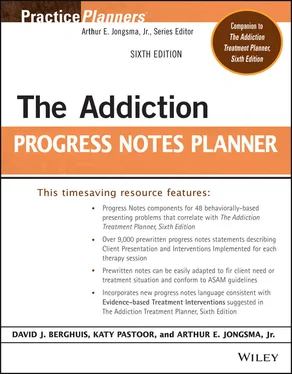The Addiction Progress Notes Planner
Здесь есть возможность читать онлайн «The Addiction Progress Notes Planner» — ознакомительный отрывок электронной книги совершенно бесплатно, а после прочтения отрывка купить полную версию. В некоторых случаях можно слушать аудио, скачать через торрент в формате fb2 и присутствует краткое содержание. Жанр: unrecognised, на английском языке. Описание произведения, (предисловие) а так же отзывы посетителей доступны на портале библиотеки ЛибКат.
- Название:The Addiction Progress Notes Planner
- Автор:
- Жанр:
- Год:неизвестен
- ISBN:нет данных
- Рейтинг книги:5 / 5. Голосов: 1
-
Избранное:Добавить в избранное
- Отзывы:
-
Ваша оценка:
- 100
- 1
- 2
- 3
- 4
- 5
The Addiction Progress Notes Planner: краткое содержание, описание и аннотация
Предлагаем к чтению аннотацию, описание, краткое содержание или предисловие (зависит от того, что написал сам автор книги «The Addiction Progress Notes Planner»). Если вы не нашли необходимую информацию о книге — напишите в комментариях, мы постараемся отыскать её.
The Addiction Progress Notes Planner, Sixth Edition
Addictions Treatment Planner, Sixth Edition
Addiction Treatment Planner, Sixth Edition
The Addiction Progress Notes Planner
The Addiction Progress Notes Planner — читать онлайн ознакомительный отрывок
Ниже представлен текст книги, разбитый по страницам. Система сохранения места последней прочитанной страницы, позволяет с удобством читать онлайн бесплатно книгу «The Addiction Progress Notes Planner», без необходимости каждый раз заново искать на чём Вы остановились. Поставьте закладку, и сможете в любой момент перейти на страницу, на которой закончили чтение.
Интервал:
Закладка:
13 Assess Severity of Impairment (13)The severity of the client's impairment was assessed to determine the appropriate level of care.The client was assessed in regard to their impairment in social, relational, vocational, and occupational endeavors.It was reflected to the client that their impairment appears to create mild to moderate effects on the client's functioning.It was reflected to the client that their impairment appears to create severe to very severe effects on the client's functioning.The client was continuously assessed for the severity of impairment, as well as the efficacy and appropriateness of treatment.
14 Explore Suicide Potential (14)The client's experience of suicidal urges and history of suicidal behavior were explored.Because the client's suicidal urges were assessed to be very serious, immediate referral to a more intensive supervised level of care was made.Because of the client's suicidal urges, and unwillingness to be voluntarily admitted to a more intensive, supervised level of care, involuntary commitment procedures were begun.The client identified suicidal urges as being present but contracted to contact others if the urges became strong.It was noted that the client has stated that they do experience suicidal urges but feels that they are clearly under control and that there is no risk of engagement in suicidal behavior.
15 Monitor Ongoing Suicide Potential (15)The client was asked to report any suicidal urges or increase in the strength of these urges.The client stated that suicidal urges are diminishing and that they are under control; the client was praised for this progress.The client stated that they have no longer experienced thoughts of self-harm; the client will continue to be monitored.The client stated that their suicidal urges are strong and present a threat; a transfer to a more supervised setting was coordinated.
16 Arrange Hospitalization (16)Arrangements were made for the client to be hospitalized in a psychiatric setting based on the fact that their mania is so intense that they could cause harm to self or others or be unable to care for their own basic needs.The client acknowledged the need for the recommended hospitalization and was voluntarily admitted to the psychiatric facility.The client was not willing to voluntarily submit to hospitalization; therefore, commitment procedures were initiated.
17 Teach About a Higher Power (17)The client was presented with information about how faith in a higher power can aid in recovery from mania/hypomania symptoms and addiction.The client was assisted in processing and clarifying ideas and feelings regarding the existence of a higher power.The client was encouraged to describe beliefs about the idea of a higher power.The client rejected the concept of a higher power; the client was urged to remain open to this idea.
18 Use Step 3 (18)The client was taught about a 12-step program's third step, focusing on how to turn over problems to a higher power.The client was taught about trusting that a higher power is going to help resolve the situation.The client participated in turning problems over to a higher power and is trusting that the higher power is going to help resolve the situation; this progress was reinforced.The client rejected the idea of turning problems over to a higher power and does not feel that this will be helpful to resolve the situation; the client was urged to remain open to this idea.
19 Review Step 3 Implementation (19)The client was assigned to turn over one problem each day to a higher power.The client's implementation of the third-step exercise of turning problems over to a higher power was reviewed.The client reported success in turning problems over to a higher power and was verbally reinforced and encouraged.The client reported difficulty or failure in attempting to turn problems over to a higher power, and these difficulties/failures were reviewed, resolved, and redirected.As the client has successfully turned problems over to a higher power, the client has been noted to have an increased pattern of relief from problems and addictive behavior.
20 Arrange for a More Restrictive Setting (20)Arrangements were made for the client to be evaluated for and/or hospitalized in a psychiatric setting based on the fact that their mania is so intense that the client could cause harm to self or others or be unable to care for basic needs.The client was supported for acknowledging the need for hospitalization and voluntary admission to the psychiatric facility.The client was not willing to submit voluntarily to hospitalization; therefore, commitment procedures were initiated.
21 Refer for Medication Evaluation (21)The client was referred for a medication evaluation to consider psychotropic medication to control the manic state.The client has followed through with the medication evaluation and pharmacotherapy has begun.The client has been resistive to cooperating with a medication evaluation and was encouraged to follow through on this recommendation.
22 Refer to Outpatient Systematic Care Team (22)The client was referred to an outpatient systematic care team to help manage medications and provide support services.The client has followed through with the referral to an outpatient systematic care team and support services have begun.The client has not engaged with the outpatient systematic care team and was redirected to follow through on this recommendation.
23 Monitor Medication Reaction (23)The client's reaction to the medication in terms of side effects and effectiveness was monitored.The client reported that the medication has been effective at reducing energy levels, flight of ideas, and the decreased need for sleep; the client was urged to continue this medication regimen.The client has been reluctant to take the prescribed medication for their manic state but was urged to follow through on the prescription.As the client has taken medication, which has been successful in reducing the intensity of the mania, they have begun to feel that it is no longer necessary and indicated a desire to stop taking it; the client was urged to continue the medication as prescribed.
24 Maintain Reviews of Psychotropic Medication (24)The client's adherence with the psychotropic medication prescription was reviewed.The client indicated a desire to terminate medication because the client “doesn't feel normal”; the client was encouraged to continue to use the medication, in consultation with the prescribing clinician.The client was monitored regarding compliance with the psychotropic medication in regard to their belief that they no longer need the medication because the client has stabilized.The client was reinforced for maintaining medication use in accordance with the prescribing clinician's expectations.The client was confronted for nonadherence with the psychotropic medication regimen.
25 Monitor Ability to Participate in Group Psychotherapy (25)The client's pattern of symptom improvement was monitored, with a focus on how stable the client is in regard to participation in group psychotherapy.The client was judged to be significantly improved and capable of participating in group psychotherapy.The client was judged to still be too manic to allow helpful participation in group psychotherapy.
26 Educate About Mood Episodes (26)A variety of modalities were used to teach the family about signs and symptoms of the client's mood episodes.The phasic relapsing nature of the client's mood episodes was emphasized.The client's mood episode concerns were normalized.The client's mood episodes were destigmatized.
27 Teach Stress Diathesis Model (27)The client was taught a stress diathesis model of bipolar disorder.The biological predisposition to mood episodes was emphasized.The client was taught about how stress can make them more vulnerable to mood episodes.The manageability of mood episodes was emphasized.The client was reinforced for their clear understanding of the stress diathesis model of bipolar disorder.The client struggled to display a clear understanding of the stress diathesis model of bipolar disorder and was provided with additional remedial information in this area.
Читать дальшеИнтервал:
Закладка:
Похожие книги на «The Addiction Progress Notes Planner»
Представляем Вашему вниманию похожие книги на «The Addiction Progress Notes Planner» списком для выбора. Мы отобрали схожую по названию и смыслу литературу в надежде предоставить читателям больше вариантов отыскать новые, интересные, ещё непрочитанные произведения.
Обсуждение, отзывы о книге «The Addiction Progress Notes Planner» и просто собственные мнения читателей. Оставьте ваши комментарии, напишите, что Вы думаете о произведении, его смысле или главных героях. Укажите что конкретно понравилось, а что нет, и почему Вы так считаете.












